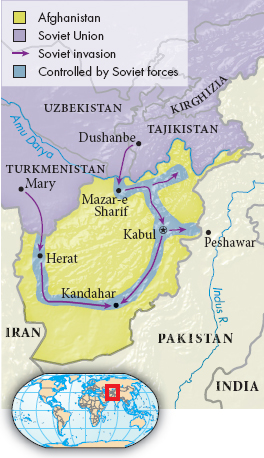From Détente Back to Cold War
The Soviets and the leaders of the Soviet satellite states also faced challenges from abroad as optimistic hopes for détente in international relations gradually faded in the late 1970s. Brezhnev’s Soviet Union ignored the human rights provisions of the Helsinki agreement, and East-West political competition remained very much alive outside Europe. The Soviet invasion of Afghanistan in December 1979, designed to save an increasingly unpopular Marxist regime, alarmed the West. Many Americans feared that the oil-rich states of the Persian Gulf would be next, and once again they looked to the NATO alliance and military might to thwart Communist expansion.

The Soviet War in Afghanistan, 1979–1989
President Jimmy Carter (r. 1977–1981) tried to lead NATO beyond verbal condemnation of the Soviet Union and urged economic sanctions against it, but only Great Britain among the European allies supported the American initiative. Some observers concluded that NATO had lost the will to act decisively in dealing with the Soviet bloc.
The Atlantic alliance endured, however, and the U.S. military buildup launched by Carter in his last years in office was greatly accelerated by President Reagan. Increasing defense spending enormously, the Reagan administration deployed short-range nuclear missiles in western Europe and built up the navy. The broad shift toward greater conservatism in the 1980s gave Reagan invaluable allies in western Europe, including Margret Thatcher of Great Britain and Germany’s Helmut Kohl.
